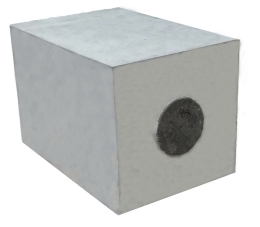- 26
- Oct
Brief analysis of methods to increase the rate of ladle blowing (2)
Brief analysis of methods to increase the rate of ladle blowing (2)

(Picture) GW series slit type breathable brick
The bottom blowing rate of the ladle is the guarantee for smooth production. The long-life air-permeable brick is the guarantee of high blowing rate. Regarding the method of improving the rate of ladle blowing, we have analyzed from the perspective of the optimization of the bottom-blown ventilating brick material, (see the previous part for details), in this article, we analyze from the perspective of extending the life of the ventilating brick.
1. Make the best use of everything to maximize the function of breathable bricks
A large flow of bottom-blowing gas will accelerate the erosion of bottom-blowing ventilating bricks. Therefore, when bottom-blowing ventilating bricks are in use, it is required to strictly control the gas flow at different stages.
Therefore, during the tapping process, the gas source should be opened for bottom blowing, so that the cold steel infiltrated into the air channel is melted under the immersion of high-temperature molten steel, so as to avoid the new blockage of the air channel due to the high temperature and static pressure of the molten steel. Promote the smooth progress of bottom blowing;
Blow with high pressure, that is, use 1.5-1.8 MPa high-pressure gas to blow the condensed steel in the slit out of the air passage within 3-5 s (repeatedly 2-3 times) when blowing at the bottom. The blowing rate is extremely likely to increase by 2.5% -3%.
During use, always observe the connection of the gas pipeline. If the joint leaks, it should be dealt with immediately to prevent the pressure in the pipeline from being reduced due to the gas leakage and the bottom blowing failure.
Record the residual thickness of the বায়ু প্রবেশযোগ্য ইট after unpacking at any time, so that the bottom-blowing air-permeable brick can be used to the greatest extent and its service life can be prolonged under the premise of safe use.
2. Proper maintenance
During the pouring process, the ladle cannot be bottom blown, so a large amount of steel infiltration occurs at this stage. After pouring, the temperature of the inner lining of the ladle drops sharply, and the bottom-blown air-permeable brick becomes concave after being corroded. To avoid rapid solidification of the accumulated steel, the ladle should be dumped immediately and the inert gas source such as nitrogen or argon should be turned on at the same time. Control the air source pressure within the range of 0.8-1. 0 MPa (for most steel mills), and blow out the unsolidified steel in the air duct and the steel accumulated in the recessed part of the bottom-blowing air-permeable brick. The effect of cleaning and maintenance of the air passage of the ventilating brick can promote the smooth operation of the next blow. To
Sometimes due to the production rhythm and other reasons, the waiting time is long, or the bottom-blowing ventilating brick working surface is covered with residual steel slag, and the surface must be cleaned. Use oxygen or a mixture of oxygen and coal gas to burn off the residual steel slag on the surface, and at the same time turn on the gas source to blow back, blow out the steel seepage slag in the air passage and recessed parts, and also avoid the residual steel and residue during purging Was blown into the airway again. This kind of maintenance measures are indispensable for the demanding refining process.
